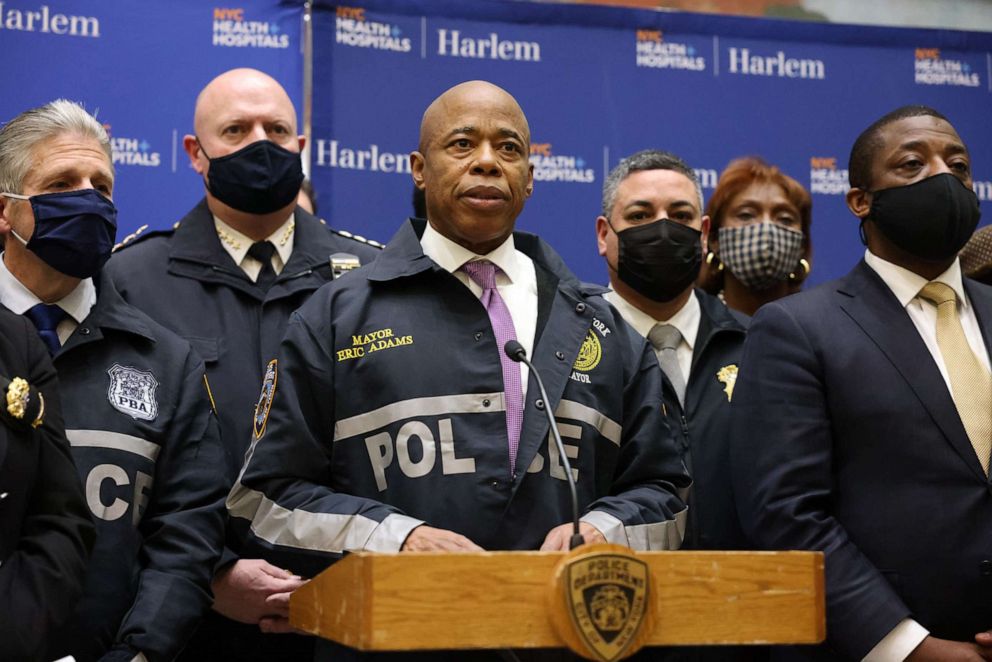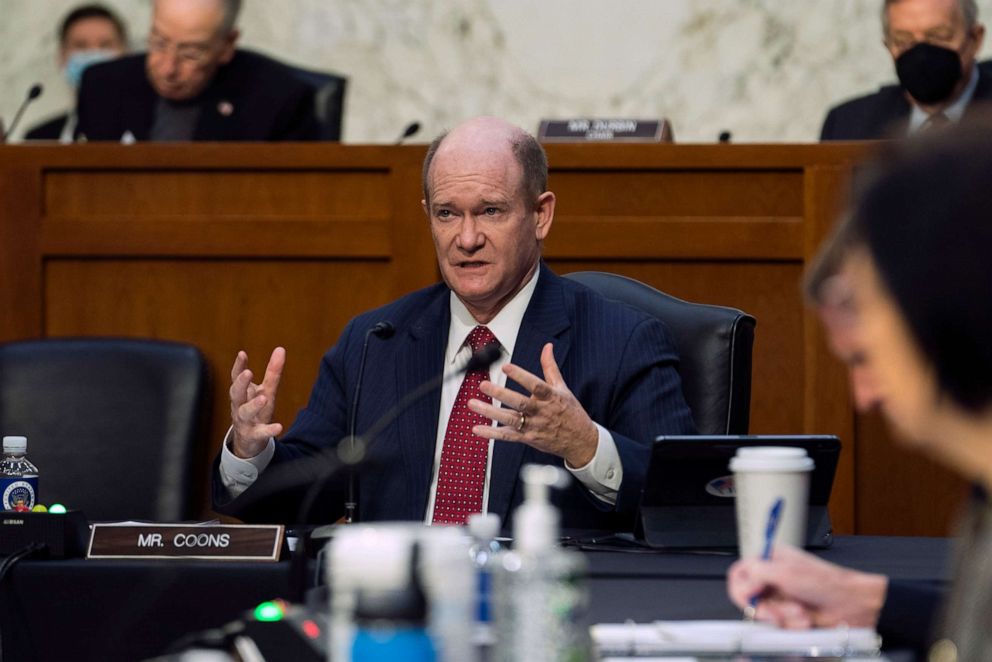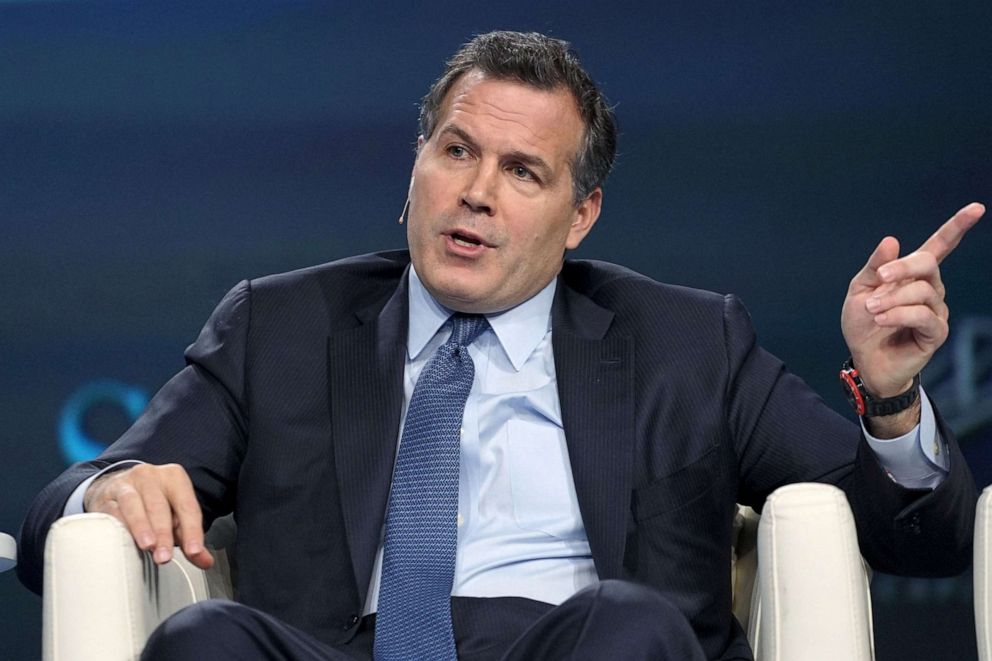Mayor's anti-violence 'blueprint' could shape Democratic messaging: The Note
The former NYPD captain unveiled his strategy after a deadly cop shooting.
The TAKE with Averi Harper
If successful, New York City Mayor Eric Adams' plan to combat crime, dubbed the "blueprint to end gun violence," could become the blueprint to reorient Democratic messaging on public safety.
Adams, a former NYPD captain, unveiled his strategy Monday in the wake of a shooting that left one NYPD officer dead and another critically injured. Echoing the tough-on-crime posture that arguably helped put him in office, Adams announced plans to increase police presence all over the nation's largest city.
"New Yorkers feel as if a sea of violence is engulfing our city," Adams said. "But as your mayor, I promise you I will not let this happen. We will not surrender our city to the violent feud. We won't go back to the bad old days."

His plan includes the reinstatement of a controversial plainclothes anti-crime police unit that was disbanded shortly after the killing of George Floyd and subsequent protests calling for police reform.
The unit's tactics, including stop-and-frisk, were declared unconstitutional. At the time, NYPD officials said the unit was responsible for a disproportionate number of fatal shootings by police and civilian complaints.
Adams said the officers in the new iteration of this unit will wear body cameras and promised consequences for officers who take inappropriate action. The idea isn't without critics concerned about the return of the unit known for its aggressiveness, particularly with New Yorkers of color.
But beyond the possible impact on public safety in New York's five boroughs, if employed by other Democrats, it could serve as a means to dismantle broad-brush assertions from the right that claim Democrats are soft on crime and that the GOP is the party of so-called "law and order."
The RUNDOWN with Rick Klein
The search for bipartisanship got exactly nowhere on Build Back Better or voting rights at the federal level.
But while political attention was trained on domestic matters, a foreign crisis could still feature the parties working together. Democratic and Republican senators continue to talk through the recess week about a bipartisan package of sanctions to impose on Russia -- though timing and White House support for the direction they are going in are still both in flux.
A bipartisan group of seven senators kept a scheduled trip to Ukraine last week despite the Senate's focus on a voting bill that failed to advance. Since then, while the chairman and top Republican on the Foreign Relations Committee have different proposals on the table, senators have kept communications open about passing something that could draw support from both parties.

Sen. Chris Coons, D-Del., said on ABC's "This Week" Sunday that passing a bipartisan sanctions package "will show resolve and determination." But whether new sanctions should snap in before Russian President Vladimir Putin makes a move into Ukraine remains an issue.
The Biden administration has said additional sanctions should serve as a deterrent more than a preemptive act. While many Republicans have blasted the White House for not acting faster or supporting stricter sanctions that would go into effect now, some are also agreeing with the need to send a united message.
"I think passing something is better than passing nothing," Sen. Kevin Cramer, R-N.D., said after the senators' trip to Ukraine.
The TIP with Alisa Wiersema
Despite former President Donald Trump not yet having indicated whether he plans to endorse any candidates in Pennsylvania's Republican Senate primary, the race is accelerating with high-profile endorsements and major campaign spending.
The newest GOP contender, David McCormick, is set to campaign alongside Sen. Ted Cruz on Tuesday in the Lehigh Valley. The Texas senator backed McCormick just a week after the former hedge fund CEO announced his candidacy. McCormick already has the endorsement of Trump's original Senate pick, Sean Parnell. Parnell dropped out of the race in November.

According to AdImpact, the race is already shaping up to be one of the most expensive in the country, and the two newest Republican faces on the campaign trail -- McCormick and Dr. Mehmet Oz -- appear to be driving up spending. Prior to officially announcing his campaign bid, McCormick had spent more than $1 million on cable and broadcast ad buys, AdImpact reported.
Along with heavy campaign spending, Pennsylvania is also set to be in the spotlight over policy, as President Joe Biden heads to Pittsburgh on Friday to promote infrastructure spending. The decision to make the voter-critical area of southwestern Pennsylvania one of the first places the president visits during a midterm election year highlights the importance both sides of the aisle are placing on the state's political trajectory.
THE PLAYLIST
ABC News' "Start Here" Podcast. On Start Here Tuesday morning, the Supreme Court will hear a challenge to affirmative action in college admissions. ABC's Devin Dwyer walks us through the story. Then, ABC's James Longman reports on the latest from the ISIS prison break in Syria. And, ABC's Elizabeth Schulze visits a bitcoin mining operation. http://apple.co/2HPocUL
WHAT YOU NEED TO KNOW TODAY
Download the ABC News app and select "The Note" as an item of interest to receive the day's sharpest political analysis.
The Note is a daily ABC News feature that highlights the day's top stories in politics. Please check back Tuesday for the latest.




